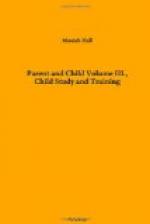4. What is the fundamental cause of the changes that take place?
5. What may be said about religious emotions and conversions during this time?
6. What practical suggestions would you give to help the parents guide the adolescent safely over this dangerous period of life?
Supplemental Studies: At this point it will be well to take the supplemental lessons in this book, page 133 to end of volume. These studies are based on the lectures given by Dr. John M. Tyler. They will blend beautifully with Professor Hall’s discussion and will reinforce strongly the study of this adolescent age.
TRAINING IN THE HOME
Certain Phases of Training and Education Can Be Best Accomplished by the Home
There are four great agencies or factors concerned in the training and education of the child: these are, the home, the school, the church, and the state, or society. Of these, the home ought to be the most helpful since it is the most important. The child is a part of the flesh and blood of the parents; he belongs to them in a vital way that transcends his relationship to everything else in the world.
The parent, then, is the natural trainer and educator of the child, particularly during the dependent period before the age of accountability is reached. The parent ought not to shirk this duty or attempt to transfer it to some other agency. But at the present time there is a strong tendency to shift more and more responsibility to other agencies, especially to the school. Many habits which the home once developed are now left largely to the school; religious training is turned over more and more to the Sunday School and the church, and much more of the time of children is now spent in social amusements away from home than ever before.
Then, too, it is certain that the old-time home is passing. It seemed to have higher ideals and more definite purposes in life than homes now possess; moreover, it occupied most of the time of the child and taught him to be industrious and proficient, and to regard life with much more seriousness than does the home of to-day. The home or the family, therefore, is not the great superlative factor that it ought to be in the training and education of the child.
From the first chapter of Cope in “Religious Education in the Family,” the following is quoted: “The ills of the modern home are symptomatic. Divorce, childless families, irreverent children, and a decadence of the old type of separate home life are signs of forgotten ideals, lost motives, and insufficient purposes. When the home is only an opportunity for self-indulgence, it easily becomes a cheap boarding house, a sleeping shelf, an implement for social advantage. While it is true that general economic development has effected marked changes in domestic economy, the happiness and efficiency of the family do not depend wholly on the parlor, the kitchen, or the clothes closet. Rather, everything depends on whether the home and family are considered in worthy and adequate terms.




